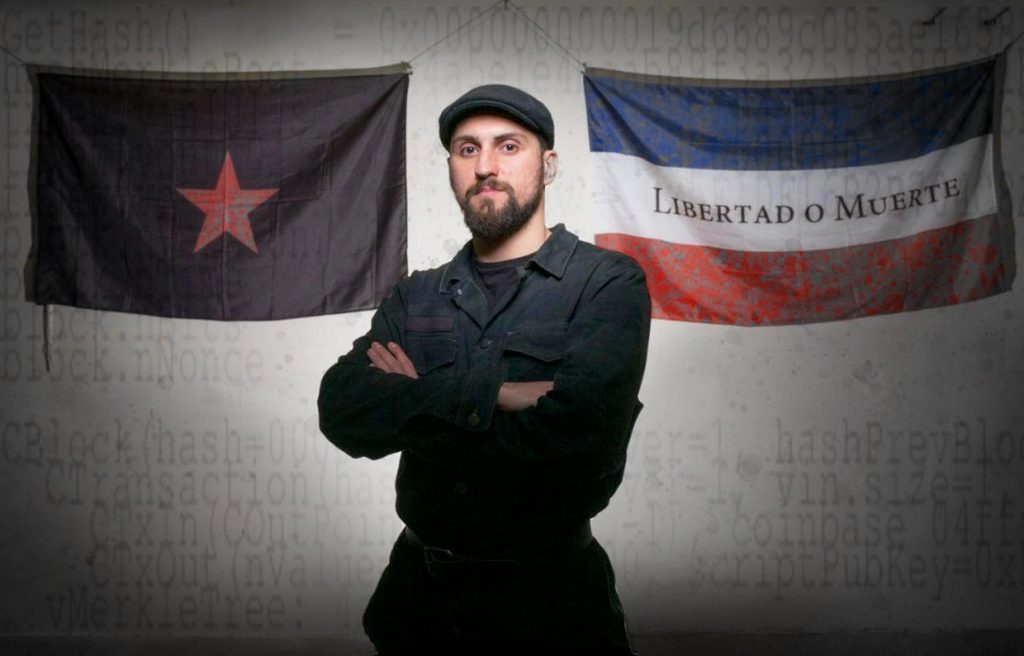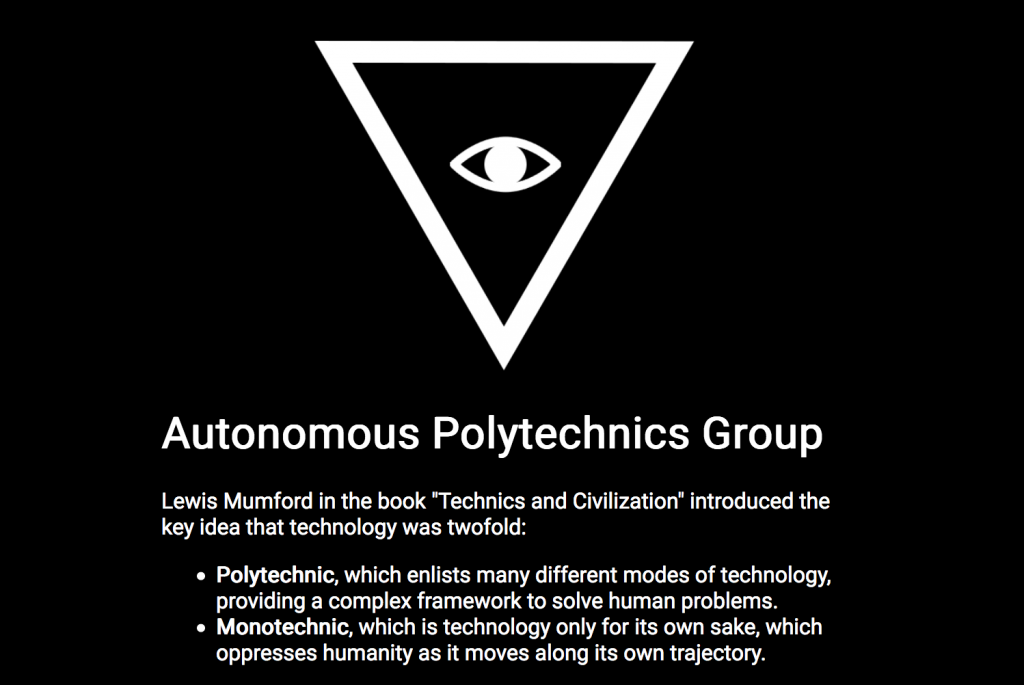
Freedom Fighter Seeks to Return Blockchain to Radical Roots
According to a fascinating article published in Wired, one of bitcoin’s key technical innovators is seeking to recruit an “army” of politically-aware “hacker monks” to spark, in his words, “complete collapse of the world state system.”
Leveraging blockchain and other 21st-century tech breakthroughs as well as a unique, egalitarian form of governance forged in the fight against ISIS in Syria, hacktivist Amir Taaki aims to foment a peaceable transition towards a more free and democratic century ahead amidst a world threatened both by Orwellian state and corporate institutions, and violent ideologies such as ISIS and today’s burgeoning extreme-right movements.
A Londoner with Persian and British parents, Taaki took an early interest in coding and software development. In the early 2010s following a stint in professional poker, he become involved in the open-source free software movement—a community steeped in ideology as much as innovation—which gave rise to bitcoin and other projects conceived to decentralize and democratize computing power. Lauded as “a figure of worship in the bitcoin community,” Taaki developed some of the bitcoin network’s early improvements and standards, helping the cryptocurrency to gain traction and adoption more than half a decade before 2017’s profit-driven “crypto craze” which saw the currency and its myriad copycats skyrocket in value.

Amir Taaki serving with the YPG, the Kurdish “People’s Protection Units” currently battling ISIS, rival Syrian forces, and Turkish military incursions. Via amirtaaki.org
After helping to establish crypto exchanges in the UK, Taaki co-founded Dark Wallet, an innovative bitcoin tool that allows for anonymous, untraceable transactions on the network. Like other prominent blockchain networks, bitcoin suffers a potential Achilles’ Heel in its architecture: since a blockchain records all transactions on an open and public ledger, state authorities or criminal hackers can track people’s transactions with relative ease, once identified. Dark Wallet’s initial success even earned Taaki recognition on Forbes’ prestigious “30 Under 30” list of young entrepreneurs in 2014.
At the end of 2014, however, Dark Wallet received negative press and government attention following news that ISIS and other criminal organizations were using the technology to launder money and evade tracking. Similarly, OpenBazaar, a decentralized online market and offshoot of another of Taaki’s projects, attracted its share of controversy for many of the same reasons that its infamous predecessor Silk Road and other “dark markets” did—namely, that OpenBazaar was facilitating sales of drugs, weaponry and even bespoke criminal services such as contract killings.
Far from supporting ISIS and other criminal entities, however, Taaki was actually fighting the Islamic State. After disappearing from his online communities shortly after his fortunes shifted, Taaki “resurfaced” in the hackitvist community in 2015 with news that he was on the ground in Rojava, the autonomous Kurdish region in northern Syria. Inspired by the communalist political structures championed by the Kurds during their beleaguered fight for survival against ISIS, the Syrian regime, and other extremist adversaries, Taaki was eager to participate in what he calls “the most important revolution of this century.”
While assisting Rojava with technical development and even fighting ISIS on the front lines as a member of Rojava’s YPG militia, Taaki began to theorize how the Kurds’ successful implementation of a political system known as “democratic confederalism” might inspire what he envisioned as “the solution for lasting peace in the middle east, and the way forward for our crisis of civilization in the west.”
Above: A Primer on Rojava, which has created a sustainable feminist, multi-ethnic haven amidst the chaos of the Syrian Civil War.
Worried by the abuses of neoliberal state and corporate power as well as the threat of terrorist organizations such as ISIS and grassroots fascist movements in Europe and the U.S., Taaki believes that the present global order is becoming dangerously untenable. In the interview with Wired, he expressed plans of how he aims to combine new ideologies such as democratic confederalism and technologies including blockchain and other p2p tech to create a revolutionary hacker dojo-cum-coding camp where other “autonomous polytechnics” can theorize, train and code in an ascetic environment.
According to Wired, Taaki is starting in Catalonia, where he assumes spartan quarters in an activist squat and is seeking to begin his project by recruiting five people—ideally from diverse backgrounds and genders—to explore how new technologies and ideas can further the cause of Catalonian autonomy and shape how other units of “hacker monks” might advise and assist similar self-governance movements around the globe:
“We want to establish a headquarters here in Catalonia. To gather together a team of hackers, that we can then train and send to manage our projects,” [Taaki] says, in English. “It will be like a startup accelerator, only a politicized one. Not driven by profit, but by social change.”
Defining “freedom” as “the ability to satisfy our needs at a local level,” Taaki sees a brighter future in decentralized, autonomous, and locally-governed regions following Rojava’s model, where shared power is derived at a local level upwards rather than from strong centralized governments or corporate dominion:
“First of all, there would be a very strong rural movement of agricultural producers. There would be strong local and national identity in culture and fashion. People would organise politically, democratically at a local level. […] As long as Catalans keep eating McDonald’s, buying clothes from H&M, watching MTV, they won’t be free.”
Likening the present global social, economic, and political zeitgeist to a “second version of the Roman Empire” in decline, Taaki warns that western political powers have yet to address the present system’s fundamental flaws, leading to mass dissatisfaction and the dark allure of racist and fascist ideologies which—with growing and worrisome success—seek to allay wavering confidence in the world’s current economic model. Taaki argues that mainstream politics should address valid critiques of capitalism before reactionary movements such as the far right or ISIS begin to gain traction, noting that “unlike those forces [of fascism, white supremacy, ISIS, et al], I am on a side that doesn’t seek open conflict with the state. We should start a conversation.”
In terms of the technology, Taaki sees a great deal of promise in furthering bitcoin and other blockchain projects—not only for developing feasible stateless currencies that can operate at scale, but also for non-monetary purposes such as decentralized markets, messaging systems and infrastructure services. In a way, Taaki is taking many of the aspirations of his contemporaries in the free software movement to more ambitious and global ends.
While Taaki and others of his ilk in the growing blockchain revolution owe much to the hacktivists and crypto-libertarians who fostered the technology in its early days, Taaki expressed concern that the cryptocurrency space is corrupted by greed and cutthroat individualism, or quoting Wired, “a hodgepodge of day-traders, Lamborghini buffs and token-peddling chancers.” According to Taaki:
“Bitcoin doesn’t have any vision behind it, any vision of where it’s going […] All the original ideas about using bitcoin for challenging power — or privacy, or new forms of economic systems — are falling by the wayside. Now it’s simply a small community obsessed with the price going up.”
Taaki and his crypto-comrades hope that ultimately the lessons learned from Rojava can help to foment peaceful, tech-driven revolutions not only in Catalonia but also, revealed in Wired, “in politically fractious regions such as India’s Kerala, Mexico, and Argentina”—before it’s too late.

A screenshot from the cryptic landing page for Amir Taaki’s “hacker dojo.”







My brother suggested I might like this website. He was entirely right.
This post actually made my day. You can not imagine simply how much time I had spent for this information! Thanks!
Hi there! I know this is sort of off-topic however I needed to ask.
Does managing a well-established blog like yours take a large amount of work?
I’m completely new to running a blog but I do write in my diary everyday.
I’d like to start a blog so I can share my own experience
and feelings online. Please let me know if you have any suggestions or tips for new aspiring blog owners.
Appreciate it!
hi!,I really like your writing so so much! proportion we communicate
extra approximately your post on AOL? I need an expert in this house to solve my problem.
May be that is you! Looking ahead to peer you.
I very glad to find this site on bing, just what I was searching for : D also saved to my bookmarks.
I do believe all of the ideas you have presented to your post.
They’re really convincing and will certainly work.
Nonetheless, the posts are very short for beginners.
May you please lengthen them a bit from subsequent time?
Thank you for the post.
It can. This one is full time for several people, and several months to conceive, develop, deploy and tweak. However, it depends on what you are looking for.
Admiring the time and effort you put into your blog and in depth information you offer.
It’s great to come across a blog every once in a while
that isn’t the same out of date rehashed material. Great
read! I’ve bookmarked your site and I’m adding your RSS feeds to my Google account.
It’s fantastic that you are getting ideas from this post as well as from our dialogue made at this time.
Everything is very open with a clear explanation of the issues.
It was really informative. Your site is useful.
Many thanks for sharing!
Good day! Do you know if they make any plugins to protect against hackers?
I’m kinda paranoid about losing everything I’ve
worked hard on. Any suggestions?
Yes, it depends on where you host your site (e.g. WPEngine, HostGator), what it’s in (Joomla, WordPress, etc). Many providers integrated a fair to excellent base level of protection to start.
I’m impressed, I must say. Rarely do I encounter a blog that’s
both educative and interesting, and without a doubt, you have hit the
nail on the head. The problem is something that not enough
men and women are speaking intelligently about. I am very happy I found this
in my hunt for something concerning this.
What’s up, just wanted to tell you, I enjoyed this article.
It was inspiring. Keep on posting!
hello there and thank you for your information – I’ve definitely picked up anything new from right here.
I did however expertise a few technical issues using this website, as I experienced to reload the
website a lot of times previous to I could get it to load correctly.
I had been wondering if your hosting is OK? Not that I’m complaining,
but sluggish loading instances times will sometimes affect your placement in google and
could damage your high quality score if ads and marketing with Adwords.
Well I’m adding this RSS to my e-mail and can look out for a lot more of your
respective fascinating content. Ensure that you update this again very soon.
Hi there, its good paragraph concerning media print, we all know
media is a wonderful source of information.
Hello there, You have done an excellent job. I’ll definitely digg it and personally
suggest to my friends. I am confident they will be benefited from this site.
whoah this blog is magnificent i love studying your posts.
Keep up the great work! You know, lots of people are searching round for this info, you could aid them greatly.
What’s up, its pleasant piece of writing on the topic of media
print, we all be familiar with media is a enormous
source of information.
I could not refrain from commenting. Very well written!